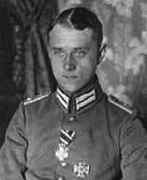Person: Doetsch, Gustav

Gustav Doetsch wasa German mathematician who worked on the Laplace Transform. His connections with the Nazis led to difficulties after World War II.
Mathematical Profile (Excerpt):
- It was common practice among German students at this time to study at a number of different universities during their undergraduate years and Doetsch was typical in this respect.
- Doetsch was awarded his doctorate in 1920, and in the following year he submitted his habilitation thesis to the Technical University of Hanover and received the right to lecture.
- Doetsch says that the natural scientist turns to mathematics to provide an explanation for experimental facts.
- Also in the 1920s Doetsch collaborated with Felix Bernstein on what is considered today to be the modern version of the Laplace transform.
- During his years in Stuttgart, Doetsch became an active member of the peace movement.
- Doetsch had collaborated with a number of Jewish mathematicians; his doctoral supervisor was Edmund Landau and his collaborator on the Laplace transform was Felix Bernstein, both Jewish mathematicians.
- Doetsch, however, seems to have given wholehearted support to the ideas of National Socialism as put forward by the Nazis in the 1930s.
- Both Edmund Landau and Felix Bernstein were dismissed from their posts, actions which were approved of by Doetsch, who gave his full support to Bieberbach in his attempt to become chairman of the German Mathematical Society in 1934.
- Doetsch argued that Perron, who had been appointed as chairman of the German Mathematical Society in September 1933, could no longer be tolerated and he argued strongly for the idea that Bieberbach should be made chairman for life.
- Despite his support for the Third Reich, Doetsch was investigated by them, particularly over his earlier involvement with the peace movement.
- From around 1936 Doetsch seems to have been less energetic in his support for National Socialism.
- Doetsch was given a role with the Reichsluftfahrtministerium (Reich Air Force Ministry) in Berlin coordinating the mathematical contributions relevant to the war effort by the Air Force.
- In this respect Doetsch and Süss, who was chairman of the German Mathematical Society, were in direct competition and relations between the two men became very poor.
- Doetsch made major efforts in the Reich Air Force Ministry to coordinate mathematicians and mathematical knowledge for the purposes of the war.
- From 1942 Doetsch became increasingly isolated in the Reich Air Force Ministry and consequently in 1944 he was transferred to the Institute for Theoretical Ballistics at the Aviation Research Institute Hermann Göring at Braunschweig.
- At the end of war Doetsch returned to the University of Freiburg but in the autumn 1945 he was suspended from his duties as professor.
- However, Doetsch never came to the mathematics department and did not hold his lectures in the building where all other mathematicians taught (instead, he used classrooms in the university's main building, normally used by philologists).
- Doetsch remained active mathematically despite his isolation in Freiburg.
Born 29 November 1892, Cologne (Köln), Germany. Died 9 June 1977, Freiburg-Günterstal, Germany.
View full biography at MacTutor
Tags relevant for this person:
Origin Germany
Thank you to the contributors under CC BY-SA 4.0! 

- Github:
-

- non-Github:
- @J-J-O'Connor
- @E-F-Robertson
References
Adapted from other CC BY-SA 4.0 Sources:
- O’Connor, John J; Robertson, Edmund F: MacTutor History of Mathematics Archive
